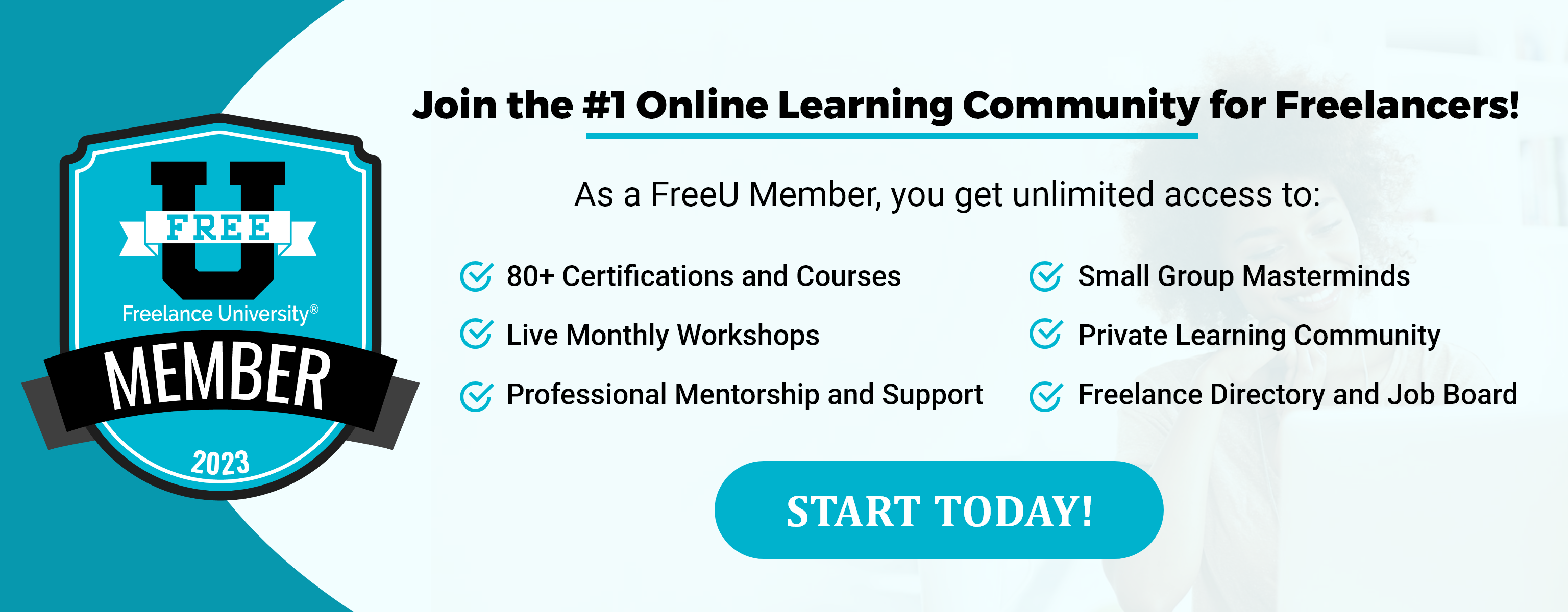Discover How to Become a Virtual Assistant From Scratch
By Craig Cannings

The virtual assistant industry is booming and not going away anytime soon! That’s what I tell students who are learning how to become a virtual assistant in our Virtual Assistant Foundations course — and statistics back it up. Virtual assistants make business owners happy while enjoying a fulfilling, flexible career themselves.
First of all, if you haven’t heard the term before, a virtual assistant (VA) is a type of freelancer who performs a variety of administrative, content, marketing, technical, and support tasks from a remote location for one or more clients.
According to the statistics portal Statista, the number of freelancers in the United States is projected to grow to 86.5 million people by 2027, as the remote work revolution continues. In 2022, VirtuDesk reported that “half of the respondents confirm that hiring a virtual assistant helps in cutting down expenses when it comes to running a business” and “84.4% of the business owners reported a positive impact within their business since hiring a virtual assistant.”
So, if you’re wondering how to become a virtual assistant, now is the time to take action! In this comprehensive guide, we’ll explore essential skills and training needed for success in this exciting field. As an increasingly popular career choice, virtual assistants provide valuable support to businesses and entrepreneurs worldwide.
Throughout this post, we’ll delve into various aspects of becoming a successful virtual assistant — from developing your skill set and obtaining relevant certifications to setting up an efficient home office space. We’ll also discuss the importance of building a strong reputation as a VA by maintaining quality standards and gathering client testimonials.
Finally, we’ll touch upon finding job opportunities online through specialized platforms and highlight the benefits of specializing in niche markets such as blog management or graphic design services. By following these guidelines on how to become a virtual assistant, you can confidently embark on your journey to the wonderful world of virtual assistance!
Table Of Contents: How to Become A Virtual Assistant
7 Steps to Becoming a Successful Virtual Assistant
– 1. Develop Essential Virtual Assistant Skills.
– 2. Seek Virtual Assistant Training and Certifications.
– Self-study vs. Online Courses
– Key Areas Covered in VA Training
– 3. Build Your Reputation as a Virtual Assistant.
– Importance of Client Testimonials
– Maintaining Quality Standards
–4. Set Up Your Home Office Space.
– Essential Equipment for Remote Work Success
– Reliable Internet Connection
– 5. Stay Adaptable and Versatile.
– Continuously Updating Your Skill Set
– Embracing New Technologies and Platforms
– 6. Find Virtual Assistant Jobs.
– Online Job Boards for VA Positions
– Freelance Platforms like Upwork and Fiverr
– 7. Specialize in a Niche Market.
– Becoming a Blogger’s Virtual Assistant
– Benefits of Specializing in Niche Markets
7 Steps to Becoming a Successful Virtual Assistant
1. Develop Essential Virtual Assistant Skills.
To become a successful virtual assistant, it’s crucial to have a combination of soft skills (character traits and interpersonal skills) and hard skills (specific abilities or skill sets developed through training, practice, and experience). We discuss these skills with students who are learning how to become a virtual assistant in our Virtual Assistant Foundations course.
VA Soft Skills
– Strong Organizational Abilities: You have exceptional organizational skills that enable you to prioritize multiple projects simultaneously without getting overwhelmed. This includes managing calendars and scheduling appointments, keeping track of deadlines, maintaining an organized workspace and filing system, and handling invoices or billing issues promptly – all while ensuring clear communication lines between you and your client(s).
– Adaptability: You’re ready to pivot and change on the fly in order to serve your clients and grow your business.
– Creativity: You’re ready to explore possibilities, share ideas, and generate new solutions for your clients.
– Emotional Intelligence (Empathy): You can effectively manage your emotions and interpret your clients’ emotions so you can respond appropriately.
– Clear Communication: You have strong professional writing skills and can tactfully communicate with clients using mediums like Zoom, phone, or email.
– Problem Solving: When you work remotely as a VA, you’ll need to regularly wear your “problem solving” hat, thoughtfully responding to challenges rather than reacting. You’re willing to embrace new challenges and troubleshoot.
– Team Building: You’re an effective team player and can collaborate well with many types of people and personalities.
– Service: You’re committed to serving your clients, providing (even overdelivering) the best work possible and creating a positive work relationship.
VA Hard Skills
– Technology Skills: You’ll need to develop fast and accurate typing skills as VAs often handle administrative tasks such as data entry, email management, or document preparation. Furthermore, since most tasks are performed on computers, you’ll need to become proficient in essential software like Microsoft 365 (Word, Excel), Google Workspace (Gmail, Docs, Sheets), project management tools (Trello or Asana), and cloud-based file storage platforms like Dropbox or Google Drive, to name a few. We cover this in more detail in our Virtual Assistant Foundations course.
In addition to technology, you’ll also need to develop these five core skills when learning how to become a virtual assistant:
– Digital Marketing Fundamentals: Social media management, email marketing, content marketing, and search engine optimization (SEO).
– Content Development: Blogging/article writing, website writing, social media post creation, editing, and document creation (PowerPoint, Word, or Excel).
– Basic Bookkeeping: Payables, month-end activities, and billing support.
– Basic Design: Using Canva or another design tool for social media graphics and other images.
– Administration: Coordinating schedules and calendars, monitoring and managing an email inbox, arranging travel, setting up and coordinating different virtual and in-person events, and handling new inquiries from clients or customers.
Besides these core skills mentioned above, other service-specific skill sets may also be beneficial, depending on specific job requirements – such as graphic design, social media management, or content creation. The more diverse your skill level, the better equipped you’ll be to handle a wide range of basic services and attract higher-paying clients.
For example, if you specialize in social media management, you’ll need to learn social media calendar management, new features in Instagram and Facebook, as well as social media ROI tracking. These service-specific skills can be combined with any transferable skills you have from previous experience with social media tools and tasks.
The bottom line is, developing essential skills is a crucial part of learning how to become a virtual assistant. Then, to take your knowledge and expertise to the next level, you can explore virtual assistant training and certifications.
2. Seek Virtual Assistant Training and Certifications.
Whether you’re new to the world of virtual assistance or looking to expand your skill set, investing in VA training can make a significant difference in your career. Self-learning and online classes are two main options for teaching you how to become a virtual assistant.
Self-study vs. Online Courses
If you’d rather go at your own speed, self-study could be the ideal choice for you. Many people have learned how to become a virtual assistant by teaching themselves through free resources like blogs, YouTube videos, and podcasts. For those seeking a more structured learning experience with expert guidance, a one-stop learning community like Freelance University can provide the necessary skills to become a successful VA and support you as you build your business.
Freelance University, for example, offers comprehensive courses that cover eight in-demand niches and essential VA training such as virtual bookkeeping and document preparation and management. These courses also teach how to manage multiple projects simultaneously without getting overwhelmed — crucial skills for any successful VA.
Key Areas Covered in VA Training
– Time Management: Learn how to prioritize tasks effectively while meeting deadlines consistently.
– Email Communication: Master professional email etiquette and develop efficient systems for managing client correspondence.
– Data Security and Confidentiality: Understand the importance of protecting sensitive information from unauthorized access or disclosure.
– Niche Specialization: Selecting specific industries where your unique skills are most valuable can set you apart from other general virtual assistants seeking remote work opportunities.
In addition to these key areas covered during courses offered by reputable training centers like Freelance University, earning an additional certification can further boost your credibility as a virtual assistant. Certifications like the Virtual Assistant Certified (VAC) designation also demonstrate your commitment to excellence and professionalism in the VA industry.
To remain at the cutting edge of this dynamic field, we recommend becoming a lifelong learner. As you gain experience and develop advanced skills, consider exploring additional training opportunities such as graphic design or social media management courses to expand your service offerings and attract more clients.
Now that you’ve learned how to become a virtual assistant by developing skills, it’s time to focus on building your reputation as a VA.
3. Build Your Reputation as a Virtual Assistant.
Once you’ve developed the necessary skills, it’s important to establish your reputation within the industry by gathering positive reviews from your initial clients.
Gathering good feedback from the first few clients you work with can be a great way to establish your reputation in the virtual assistant field. Many companies frequently hire virtual assistants based on recommendations from previous clients — so ensure that you maintain high-quality standards throughout each project.
Importance of Client Testimonials
A good virtual assistant understands that client testimonials are invaluable when it comes to establishing credibility and trust with potential clients. Positive feedback showcases not only your expertise but also highlights how well you can meet or exceed expectations while providing top-notch administrative support.
– Gather testimonials: After successfully completing a project, ask for a testimonial from your client highlighting their satisfaction with your work.
– Showcase them: Feature these testimonials prominently on your website or online portfolio to demonstrate social proof of successful projects.
– Leverage reviews: If you’re using freelance platforms like Fiverr or Upwork, encourage clients to leave reviews after working together — these ratings will help boost visibility and attract new job opportunities.
Maintaining Quality Standards
In order to build an impressive reputation as a reliable virtual assistant, maintaining quality standards should be your main goal. Here are some tips for ensuring consistent excellence in all aspects of your work:
– Prioritize communication: Frequent updates and open lines of communication help keep both parties informed about progress while avoiding misunderstandings.
– Stay organized: Use tools like Trello or Asana to keep track of tasks, deadlines, and project updates. This will help you stay on top of your workload while demonstrating professionalism to clients.
– Deliver on time: Always strive to meet or beat deadlines — this shows dedication and commitment to the success of your client’s business.
– Continuously improve: Regularly assess your performance by seeking feedback from clients and identifying areas for improvement. Consider taking additional courses or training programs to further develop your skills as a virtual assistant.
Incorporating these strategies into your daily routine will not only enhance the quality of your work but also contribute significantly toward building a solid reputation as an exceptional virtual assistant in today’s competitive market landscape.
Now let’s discuss how creating a suitable workspace is key to achieving success as a VA. Having the right setup in place will ensure that you’re ready to tackle any task with confidence.
4. Set Up Your Home Office Space.
As you learn how to become a virtual assistant, don’t forget to ensure optimal productivity. You can do this by creating a dedicated workspace with the necessary tools and technology.
Essential Equipment for Remote Work Success
In order to create an efficient workspace, include the following equipment in your toolbox:
– Computer: A reliable computer or laptop is crucial for handling administrative work, graphic design projects, and other tasks.
– High-speed internet connection: Since most of your work will be done online, having a fast and stable internet connection is vital for staying connected with clients and completing tasks on time.
– Email account: Set up a professional email address specifically for your VA business to keep communication organized and separate from personal correspondence.
– Filing system: Organize both digital files (using cloud storage like Google Drive) and physical documents (with file folders or cabinets) to easily access important information when needed.
– Scheduling software/applications: A good scheduling tool such as Google Calendar or Asana helps manage appointments and task deadlines effectively while keeping track of multiple client engagements. You can avoid any confusion arising out of missed dates, times, etc.
Reliable Internet Connection
A successful remote working environment depends on having consistent high-speed connectivity at all times, allowing seamless collaboration between you and your client(s). To avoid potential issues related to slow connections, consider investing in a quality router and modem.
This equipment will ensure coverage throughout the entire house/apartment area and will minimize the chances of dropped calls, disrupted video conferences, delays sending large files across web platforms such as Dropbox, WeTransfer, and more.
By creating an efficient home office space equipped with the right tools, you’ll be better prepared to tackle your virtual assistant tasks head on and provide top-notch services to your clients. This will ultimately help you build a successful business and make working remotely both enjoyable and profitable in 2023.
Additionally, to stay ahead of the competition, it’s important to be adaptable and versatile, continuously updating your skill set and embracing new technologies and platforms.
5. Stay Adaptable and Versatile.
This means constantly updating your skill set and learning new technologies, software, and platforms used across various industries today. Staying agile and versatile is key to thriving as a virtual assistant in 2023.
Keeping your skills current allows you to access more job opportunities while giving yourself the potential for business growth. It means you know how to become a virtual assistant who offers in-demand services.
Continuously Updating Your Skill Set
In the ever-evolving world of technology, it’s crucial for virtual assistants to keep their skills up to date. Whether it’s mastering advanced Adobe Creative Cloud applications or becoming proficient in popular project management tools like Asana, staying current with industry trends will make you more valuable to clients who require specialized expertise. Consider enrolling in online courses or attending workshops that focus on specific areas relevant to your niche.
– Email Marketing: Learn how to create effective email campaigns using platforms like Mailchimp or ConvertKit.
– Social Media Management: Become proficient in managing social media accounts on Facebook, Instagram, Twitter, and LinkedIn using tools like Hootsuite or Buffer.
– Data Analysis: Develop data analysis skills by learning programs like Microsoft Excel or Google Sheets.
– Web Management Skills: Gain knowledge through WordPress courses to help you manage websites for clients who need assistance with their online presence.
Embracing New Technologies and Platforms
In addition to updating your skills, it’s important for you to stay informed about new technologies and platforms that can help streamline tasks or improve client services. For example, learning how to use Zapier could enable you to automate repetitive administrative tasks, saving both you and your clients time. Similarly, becoming familiar with emerging communication tools like Slack will ensure seamless collaboration between remote teams.
Maintaining a flexible approach and being able to adjust quickly can help guarantee that your VA services are in line with the most recent advancements in technology. With the right training and skill level, you’ll quickly learn how to become a virtual assistant. And you’ll be well equipped to find work on online job boards or freelance platforms like Fiverr and Upwork.
6. Find Virtual Assistant Jobs.
There are many ways to find virtual assistant jobs that suit your skills and preferences. In this digital age, various online platforms allow you to search for remote work-from-home positions or freelance gigs tailored to your expertise as a VA.
Online Job Boards for VA Positions
FlexJobs, Remote.co, and Virtual Vocations are just a few examples of job boards dedicated to flexible work arrangements, including part-time roles and remote positions perfect for aspiring VAs. These sites keep their postings updated with the latest job openings in different niches, enabling you to locate jobs that fit your aptitude and inclinations.
– Create an account on these platforms to receive personalized job recommendations based on your profile.
– Set up email alerts so you never miss out on relevant job postings.
– Take the time to research each company before applying — this will help ensure that they align with your values and goals as a professional VA.
Freelance Platforms like Upwork and Fiverr
Besides traditional job boards, freelance marketplaces such as Fiverr, Upwork, and even social media platforms like LinkedIn offer a wealth of opportunities for virtual assistants to connect with potential clients worldwide. By creating a profile on these platforms, you can showcase your skills and services, apply for jobs posted by prospective clients, and even receive direct inquiries from businesses looking to hire virtual assistants.
– Invest time in crafting an engaging profile that highlights your experience and expertise as a VA.
– Regularly update your portfolio with examples of completed projects or testimonials from satisfied clients.
– Stay active on the platform — respond promptly to messages, submit proposals for relevant job postings, and engage with other professionals in the community.
Finding virtual assistant jobs may seem daunting at first. But by leveraging online resources such as job boards and freelance marketplaces while networking within professional communities, you can increase your chances of landing profitable jobs tailored specifically for VAs who want to work remotely.
Finally, discovering freelance roles as a virtual assistant can be beneficial, yet honing in on a particular niche is essential. Let’s discuss how focusing on a particular field can make you stand apart from other freelancers and increase your chances for success.
7. Specialize in a Niche Market.
In a previous blog post titled “How to Start a Freelance or Virtual Assistant Business from Scratch,” we explain,
“It may be tempting to be a jack of all trades but it’s easy to get lost in the shuffle when focusing on too many markets at once. It’s best to find a profitable niche in your area of expertise.”
For example, if you’ve always wanted to start your own blog or work closely within the blogging community, becoming a blogger’s virtual assistant is an excellent way to earn extra money while learning about content creation and online marketing strategies firsthand. Focusing on particular niches can make it easier for clients with special requirements to find you. It will help differentiate you from other professionals as you’re exploring how to become a virtual assistant.
Becoming a Blogger’s Virtual Assistant
As a blogger’s virtual assistant, your tasks may include managing social media accounts, scheduling blog posts, editing articles, conducting keyword research for SEO purposes, creating graphics for blog posts using tools like Canva, and responding to comments on the blog. By focusing on this niche market, you’ll be able to develop advanced skills that are highly sought after by bloggers who need assistance growing their online presence.
Benefits of Specializing in Niche Markets
– Higher demand: Clients looking for VAs with specialized skills will appreciate your expertise in their industry or area of interest. This can lead to more job opportunities as word spreads about your abilities.
– Potential higher pay: As an expert in a particular field or skill set, you may be able to command higher rates than general virtual assistants due to the value-added services that only experienced VAs can provide.
– Focused networking: By specializing in one area such as graphic design or real estate support services, it becomes easier for potential clients to find you when they require this kind of administrative work. This can lead to a more targeted and efficient networking strategy.
– Personal satisfaction: If you have a passion for a specific industry or topic, working as a VA within that niche allows you to pursue your interests while earning an income. This can make the work more enjoyable and fulfilling in the long run once you’ve learned how to become a virtual assistant.
In addition to becoming a blogger’s virtual assistant, there are many other niches where VAs can specialize. Some examples include real estate support services, podcast management, e-commerce assistance, bookkeeping services, or even social media management for specific industries like healthcare or fitness professionals. The key is to identify your strengths and passions so that you can build your virtual assistant business around them.
Are You Ready to Build a Virtual Assistant Business?
Now that you know how to become a virtual assistant, your journey is about to begin — if you’re ready to take the first step. It’s a step that leads to a fulfilling freelance lifestyle.
As the VirtuDesk report mentioned above explains,
“Satisfaction is high among the hundreds of virtual assistants we were able to survey, at 96.4%. This was in comparison to their previous office jobs.”
And the industry continues to thrive. As business coach and trainer Kathy Goughenour told us in a previous Freelance Podclass episode, the VA industry is expected to continue growing consistently over the next four years. The experiment of hiring freelancers and VAs during the pandemic turned out to be a success.
It’s a success that awaits you, and we’re here to accompany you on the journey!
If you’re interested in becoming a virtual assistant or want to take your VA business to the next level, check out Freelance University for online courses and resources that can help you achieve your goals!
Take action now: Check out Freelance University and our Virtual Assistant Training Track today!









































































































